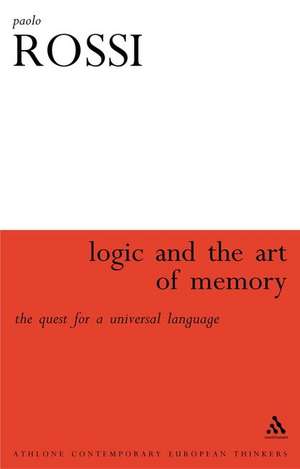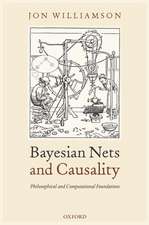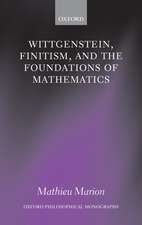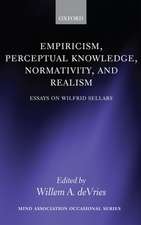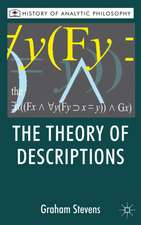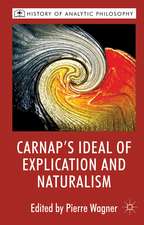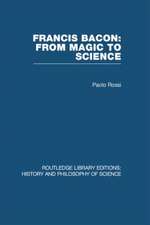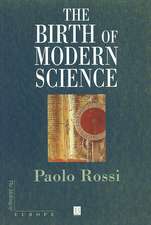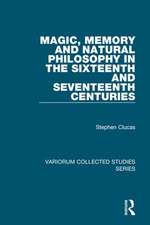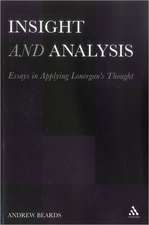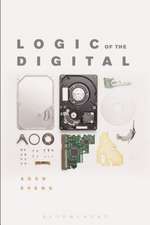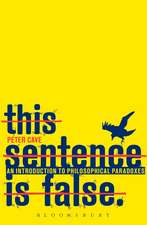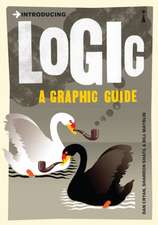Logic and the Art of Memory: The Quest for a Universal Language: Athlone Contemporary European Thinkers
Autor Paolo Rossi Traducere de Stephen Clucasen Limba Engleză Paperback – 2 ian 2006
| Toate formatele și edițiile | Preț | Express |
|---|---|---|
| Paperback (1) | 496.97 lei 6-8 săpt. | |
| Bloomsbury Publishing – 2 ian 2006 | 496.97 lei 6-8 săpt. | |
| Hardback (1) | 1066.79 lei 6-8 săpt. | |
| Bloomsbury Publishing – 31 mai 2001 | 1066.79 lei 6-8 săpt. |
Din seria Athlone Contemporary European Thinkers
- 19%
 Preț: 434.23 lei
Preț: 434.23 lei - 28%
 Preț: 493.77 lei
Preț: 493.77 lei - 27%
 Preț: 538.67 lei
Preț: 538.67 lei - 27%
 Preț: 600.46 lei
Preț: 600.46 lei - 37%
 Preț: 434.45 lei
Preț: 434.45 lei - 27%
 Preț: 376.86 lei
Preț: 376.86 lei - 19%
 Preț: 464.79 lei
Preț: 464.79 lei - 36%
 Preț: 874.36 lei
Preț: 874.36 lei - 37%
 Preț: 930.25 lei
Preț: 930.25 lei - 36%
 Preț: 340.58 lei
Preț: 340.58 lei - 28%
 Preț: 461.77 lei
Preț: 461.77 lei - 36%
 Preț: 342.94 lei
Preț: 342.94 lei - 14%
 Preț: 538.26 lei
Preț: 538.26 lei - 11%
 Preț: 497.06 lei
Preț: 497.06 lei -
 Preț: 199.10 lei
Preț: 199.10 lei - 14%
 Preț: 176.25 lei
Preț: 176.25 lei - 41%
 Preț: 117.32 lei
Preț: 117.32 lei - 43%
 Preț: 110.29 lei
Preț: 110.29 lei - 36%
 Preț: 156.79 lei
Preț: 156.79 lei -
 Preț: 223.76 lei
Preț: 223.76 lei - 24%
 Preț: 189.07 lei
Preț: 189.07 lei - 52%
 Preț: 136.35 lei
Preț: 136.35 lei
Preț: 496.97 lei
Preț vechi: 688.23 lei
-28% Nou
Puncte Express: 745
Preț estimativ în valută:
95.09€ • 99.29$ • 78.70£
95.09€ • 99.29$ • 78.70£
Carte tipărită la comandă
Livrare economică 05-19 aprilie
Preluare comenzi: 021 569.72.76
Specificații
ISBN-13: 9780826488619
ISBN-10: 0826488617
Pagini: 362
Dimensiuni: 138 x 216 x 20 mm
Greutate: 0.45 kg
Ediția:2
Editura: Bloomsbury Publishing
Colecția Continuum
Seria Athlone Contemporary European Thinkers
Locul publicării:London, United Kingdom
ISBN-10: 0826488617
Pagini: 362
Dimensiuni: 138 x 216 x 20 mm
Greutate: 0.45 kg
Ediția:2
Editura: Bloomsbury Publishing
Colecția Continuum
Seria Athlone Contemporary European Thinkers
Locul publicării:London, United Kingdom
Cuprins
Translator's Introduction; Preface; Preface to the second edition; I The Power of Images and the Places of Memory;
II Encyclopaedism and Combinatoria in the Sixteenth Century; III Theatres of the World; IV The Imaginative Logic of Giordano Bruno; V Artificial Memory and the New Scientific Method: Ramus, Bacon, Descartes; VI Encyclopaedism and pansophia; VII The Construction of a Universal Language; VIII The Sources of Leibniz's Universal Character;
Appendices; I The Liber ad memoriam confirmandam of Ramon Lull; II An anonymous vernacular treatise of the fourteenth century; III Two fifteenth-century manuscripts on the ars memorativa; IV Documents on the activities of Pietro da Ravenna; V Three late sixteenth-century manuscripts on the ars memorativa; VI Petrarch as teacher of the art of memory; VII An unpublished text by Giulio Camillo; VIII memory exercises in seventeenth-century Germany; IX The article on 'L'art mnemonique' from Diderot's encyclopaedia; X D'Alembert and 'real characters'
Notes
Index
II Encyclopaedism and Combinatoria in the Sixteenth Century; III Theatres of the World; IV The Imaginative Logic of Giordano Bruno; V Artificial Memory and the New Scientific Method: Ramus, Bacon, Descartes; VI Encyclopaedism and pansophia; VII The Construction of a Universal Language; VIII The Sources of Leibniz's Universal Character;
Appendices; I The Liber ad memoriam confirmandam of Ramon Lull; II An anonymous vernacular treatise of the fourteenth century; III Two fifteenth-century manuscripts on the ars memorativa; IV Documents on the activities of Pietro da Ravenna; V Three late sixteenth-century manuscripts on the ars memorativa; VI Petrarch as teacher of the art of memory; VII An unpublished text by Giulio Camillo; VIII memory exercises in seventeenth-century Germany; IX The article on 'L'art mnemonique' from Diderot's encyclopaedia; X D'Alembert and 'real characters'
Notes
Index
Recenzii
'A pioneering work' Frances Yates
'The best history of universal languages' Hans Aarsleff
'Bellissimo' Umberto Eco
'The best history of universal languages' Hans Aarsleff
'Bellissimo' Umberto Eco
